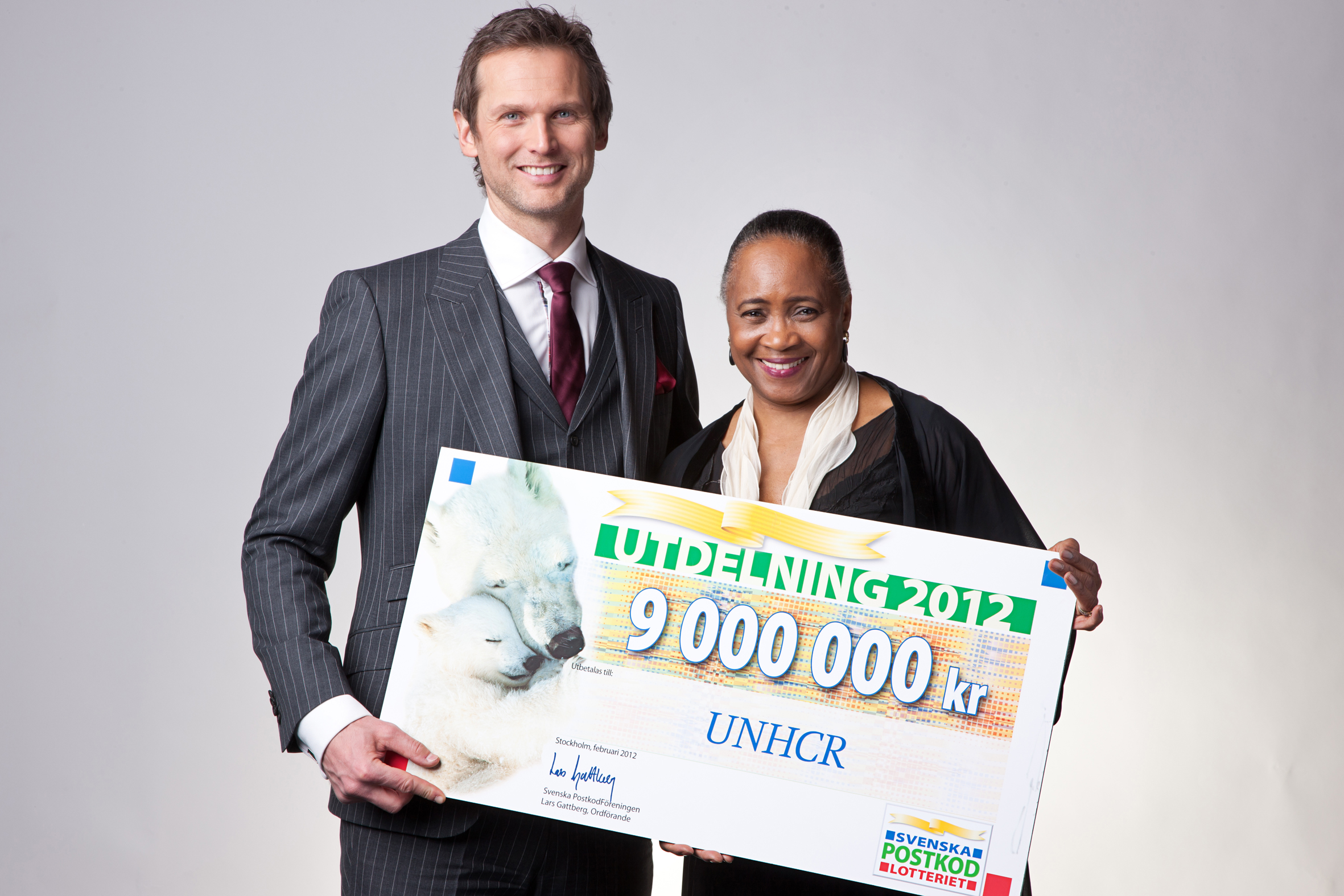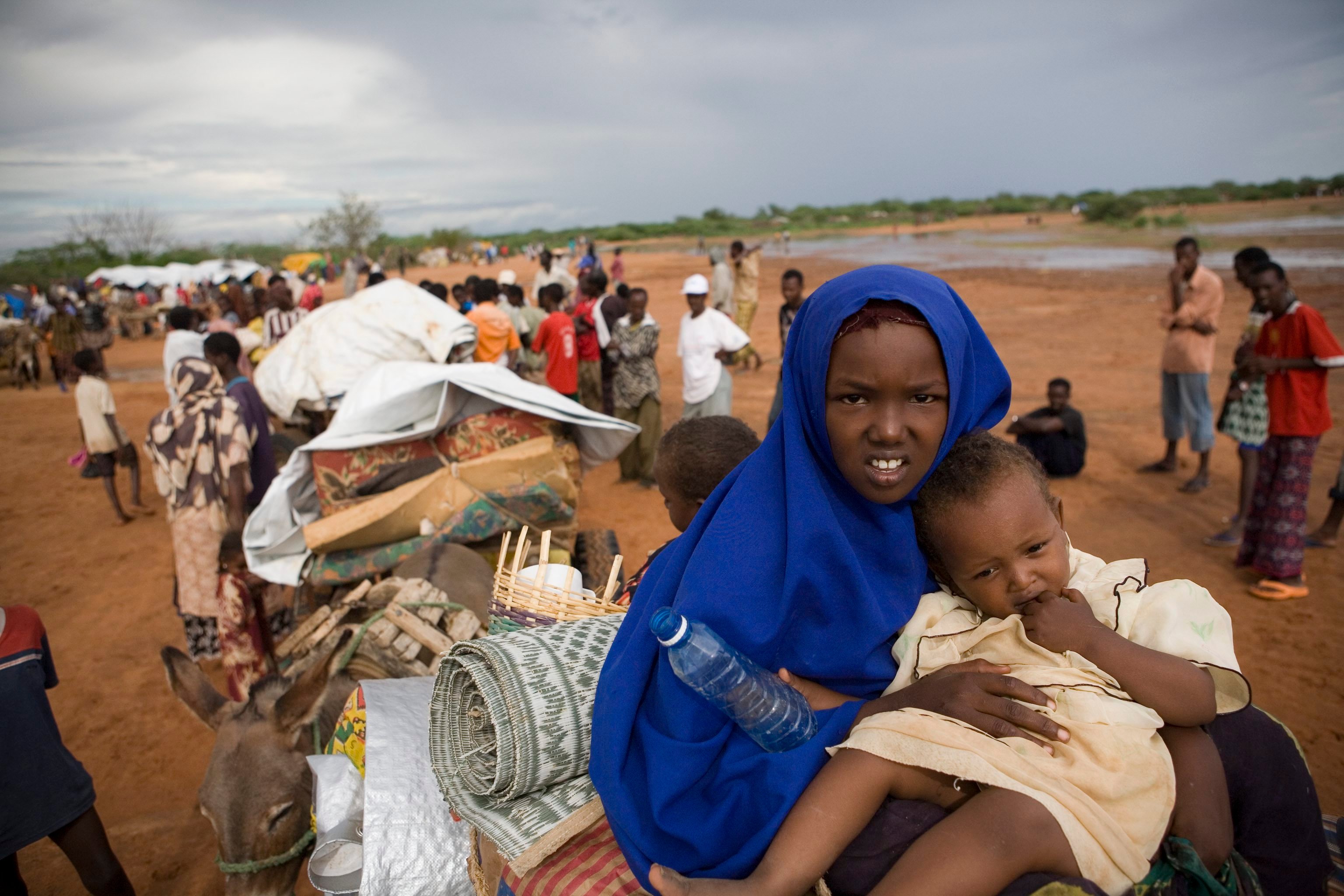Horn of Africa crisis - humanitarian update
Horn of Africa crisis - humanitarian update
Kenya
Amid continuing high numbers of arrivals of people fleeing drought, famine and conflict in Somalia, the UN refugee agency will this weekend start to move Somali refugee families into a new area of the Dadaab refugee complex. The new site, known as Kambioos, is situated close to the Hagadera camp and has a planned capacity of 90,000 people. Tents and infrastructure are being put in place and will provide much needed shelter and services.
More than 70,000 Somali refugees arrived at Dadaab during June and July, pushing the overall population there to 440,000. Some 1,500 people continue to arrive every day, and many have been settling spontaneously on the outskirts of Ifo, Dagahaley and Hagadera - the three camps that make up the Dadaab complex. As well as needing food and water, these new arrivals urgently need proper shelter, medical help and other basic services.
Meanwhile, the relocation of people into the new Ifo Extension, which began on 25 July, is continuing. So far, UNHCR and its partners have moved more than 15,000 refugees into the part of Ifo Extension formerly referred to as Ifo 3. Regarding the area formerly known as Ifo 2, this has been undergoing emergency expansion work to increase the accommodation capacity. Tents are already being pitched and we expect the first families to move in shortly, with priority given to the extremely vulnerable.
The UN refugee agency has moved thousands of tents to Dadaab over the course of the current crisis but they still are not sufficient for the growing refugee population. At present we urgently need 45,000 more tents. UNHCR has so far appealed for US$145 million to cover anticipated protection and emergency needs for the refugee crisis in the Horn of Africa until the end of the year. To date, it has either received or been given firm commitments amounting to USD$ 88 million. This equates to just 61 per cent of identified needs for Somalia, Kenya, Ethiopia and Djibouti.
Ethiopia
Immunization of some 18,000 refugee children in the Kobe camp in the Dollo Ado area of south-eastern Ethiopia kicked off yesterday (Thursday) in response to the recent outbreak of suspected measles in the refugee camps. Dollo Ado is located close to the triangle that brings together Kenya, Ethiopia and Somalia. The four-day immunization exercise by MSF-Spain with support from Ethiopia's Ministry of Health and ARRA, UNHCR's government counterpart, is expected to be completed on Sunday and will be extended to the other three refugee camps in the Dollo Ado area where other NGO health partners are also working.
Outreach workers are carrying out an intensive sensitization campaign to encourage refugee families to take their children to the health clinic for vaccination. Health workers expect to immunize an average of 4,500 refugee children between the ages of six months and 15 years each day for the coming four days to ensure immunization of all susceptible children in Kobe camp. The vaccines have been provided by UNICEF through the Ministry of Health. In addition, technical and other support is being provided by the World Health Organization (WHO).
In the meantime, vigorous community surveillance through a door-to-door screening exercise has enabled the identification of new suspected measles cases. Ninety-three cases have been identified in the Dollo Ado camps, which currently host nearly 120,000 refugees. Three measles-related deaths have been recorded officially. Health workers continue to emphasize the need to address, in parallel, the other causes of mortality in the camps which are mainly acute malnutrition, diarrhoea and respiratory tract infections.
Meanwhile, UNHCR in partnership with IOM and MSF-Holland, is continuing with the relocation of refugees from the transit centre in Dollo Ado town to the new Hilaweyn camp. On average, 1,000 refugees are relocated daily. Since the start of the exercise on August 6th, more than 5,000 refugees have been moved to the new camp where they have been settled into family tents provided by UNHCR. Upon arrival, refugees receive food made available by the World Food Programme (WFP) and other relief supplies from UNHCR. The exercise to move some 15,000 people from the transit centre to Hilaweyn is expected to be completed within a fortnight.
The daily arrival rate into the Dollo Ado area has meanwhile reduced significantly to some 200 - 300 refugees per day. In addition to the nearly 120,000 Somali refugees hosted in the four camps as well as in the transit centre there are more than 40,000 Somali refugees in camps in the Jijiga area in eastern Ethiopia.
Somalia
Meanwhile, in Somalia the second of three planned UNHCR humanitarian flights landed at Mogadishu international airport at 9am yesterday local time. The plane unloaded a 32-ton consignment of shelter and other aid items which will be distributed in the Mogadishu area.
An estimated 100,000 Somalis, driven by drought, famine and conflict, have fled to Mogadishu over the past two months in search of food, water, shelter, protection and other help. They join more than 370,000 internally displaced people (IDPs) in Mogadishu who were forced to leave their homes before the current wave of displacement. UNHCR is making preparations to deliver assistance to up to 180,000 people in Mogadishu and south central Somalia by the month's end.
Learn more about the crisis in the Horn of Africa and how to contribute by visiting the UNHCR Horn of Africa emergency site. For the latest updates follow us on Facebook or Twitter.
For further information on this topic, please contact:
-
In Geneva: Andrej Mahecic on mobile: +41 79 200 76 17
-
In Nairobi UNHCR regional office: Ron Redmond on mobile +254 734 564 019
-
In Nairobi UNHCR regional office: Needa Jehu-Hoyah on mobile +254 734 564 018
-
In Nairobi UNHCR Kenya office: Emmanuel Nyabera on mobile: +254 773 995 975
-
In Dadaab camp, Kenya: William Spindler on mobile +254 71 545 5992
-
In Kenya, UNHCR Somalia Office: Andy Needham on mobile +254 733 120 931
-
In Ethiopia: Milicent Mutuli on mobile +251 911 207 906
-
In Ethiopia: Kisut Gebre Egziabher on mobile +251 911 208 901




